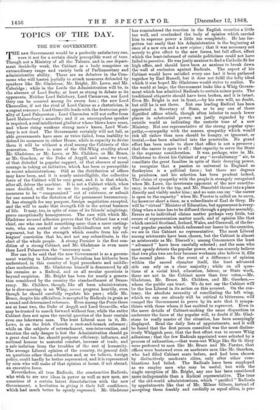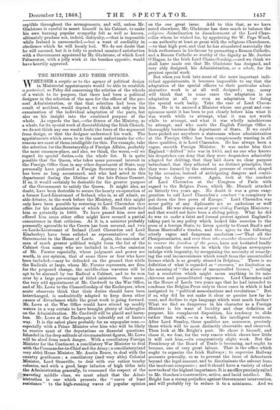TOPICS OF THE DAY.
THE NEW GOVERNMENT.
THE new Government would be a perfectly satisfactory one, were it not for a certain dimly perceptible want of tone. Though not a Ministry of all the Talents. and in one depart- ment decidedly weak, the Cabinet as a body comprises an extraordinary range and variety both of Parliamentary and administrative ability. There are no debaters in the Com- mons who will hasten joyfully to attack measures defended by speakers like Mr. Gladstone, Mr. Bright, Mr. Lowe, and Mr. Coleridge ; while in the Lords the Administration will be, in the absence of Lord Derby, at least as strong in debate as its opponents. Neither Lord Salisbury, Lord Carnarvon, nor Lord Grey can be counted among its sworn foes ; the new Lord Chancellor, if not the rival of Lord Cairns as a rhetorician, is a cogent reasoner; Lord Granville leads with the dexterous geni- ality of Lord Palmerston ; Lord Clarendon will not suffer from Lord Malmesbury's assaults ; and if an unscrupulous speaker is required, a real intellectual gladiator whose blows leave scars, and whose rising weakens strong men's knees, Lord West- bury is not dead. The Government certainly will not fail, as able governments have once or twice failed, from inability to defend its measures in either House, while in capacity to devise them it will be without a rival among the Cabinets of this generation. There is none of the Old-Whig sterility about Mr. Gladstone, or Mr. Lowe, or Mr. Childers, or Mr. Bruce, or Mr. Goschen, or the Duke of Argyll, and none, we trust, of that disbelief in popular support, of that absence of moral courage in taking an initiative, which has been so perceptible in recent administrations. Odd as the distribution of offices may have been, and it is nearly unintelligible, the collective force of the Cabinet will be very great, and it is that which, after all, drives the machine. It is not a Cabinet which, when once decided, will fear to use its majority, or allow its measures to be " compromised " out of existence, or submit for one second to the dictation of the permanent bureaucracy. It has strength for any purpose, foreign negotiation excepted, and the will to make that strength felt in the actual business of life. It may, too, in spite of some of its friends' misgivings, prove exceptionally homogeneous. The ease with which Mr. Gladstone secured adhesion proves that the Cabinet has a real chief, one who can hold something more than a mere casting- vote, who can control or abate individualisms not only by argument, but by the strength which results from his col- leagues' conviction that he, and not any subordinate, is the elect of the whole people. A strong Premier is the first con- dition of a strong Cabinet, and Mr. Gladstone is even more than Lord Palmerston the "necessary man."
Nor can it be said that the new Government is as a govern- ment wanting in Liberalism as Liberalism has hitherto been understood, in this country of legal precedents and middle- class moderation. Mr. Gladstone himself is denounced by all his enemies as a Radical, and on all secular questions is beyond suspicion. Mr. Bright has been for nearly a genera- tion considered by the country the standardbearer of Demo- cracy. Mr. Childers, though, like all born administrators, he is slow-moving, is no Whig, means progress heartily, even though he should carefully regulate his pace ; while Mr. Bruce, despite his officialism, is accepted by Radicals in grain as a sound and determined reformer. Even among the Peers there are at least two, the Duke of Argyll and Lord Granville, who may be trusted to march forward without fear, while the entire Cabinet does not upon the special question of the hour contain even one lukewarm man. The least Liberal man in it, Mr. Lowe, is on the Irish Church a root-and-branch reformer ; while on the subjects of retrenchment, non-intervention, and taxation the only danger is lest the Administration should go a great deal too far, should postpone efficiency, influence, and national honour to material comfort, increase of trade, and a safe isolation from the troubles of the rest of humanity. The average Liberal opinion of the country, its general drift on questions other than education and, as we believe, foreign policy, could hardly be better represented, and it is represented by men who will make of that opinion at home, if not abroad, an executive force.
Nevertheless, all true Radicals, the constructive Radicals, who wish to see new ideas in power as well as new men, are conscious of a certain latent dissatisfaction with the new Government, a hesitation in giving it their full confidence, which had much better be openly expressed. Mr. Gladstone has remembered the reaction in the English counties a little too well, and overlooked the body of opinion which carried him to supreme power a little too completely. He has for- gotten too easily that his Administration is the beginning at once of a new era and a new regime ; that it was necessary not merely to give effect to the new forces, but full effect, effect which the least-informed of outside politicians could not have failed to perceive. He was justly anxious to find a Catholic fit for high office, and should have been as anxious to break down the wall of exclusion against Radicals. The aspect of his Cabinet would have satisfied every one had it been gathered together by Earl Russell, but it does not fulfil the lofty ideal which it was hoped Mr. Gladstone would strive to realize. To the world at large, the Government looks like a Whig Govern- ment which has admitted Radicals to certain minor posts. The traditional etiquette should have been broken, and it is intact. Even Mr. Bright is not in front,—by his own will, no doubt, but still he is not there. Not one leading Radical has been appointed a Secretary of State, or to any one of those dignified offices which, though often inferior to much lower places in substantial power, are justly regarded by the outside world as indicating the esoteric tone of a new Ministry. Not one representative of the strong popular sym- pathy,—sympathy with the masses, sympathy which would risk all rather than men should be hungry, or ignorant, or brutal,—has been admitted into the penetralia. No grand effort has been made to show that office is not a preserve ; that the career is open to all ; that capacity to serve the State is the supreme consideration. It was, perhaps, wise in Mr. Gladstone to divest his Cabinet of any " revolutionary " air, to conciliate the great families in spite of their decaying power, to recognize that a passion so universal in England as flunkeyism is a political force ; but there are degrees in prudence, and his selection has been prudent indeed. The claim of sympathy with the people is strangely recognized when Mr. Lowe, the inveterate opponent of the new constitu- ency, is raised to the top, and Mr. Stansfeld thrust into a place directly and visibly under him ; and no man can say "the career is open to the capacity" when Mr. Forster is called on to serve, for however short a time, as a subordinate of Earl de Grey. He will be "virtual " Minister of Education, but appearance is every- thing when a tone has to be diffused through a popular assembly. Errors as to individual claims matter perhaps very little, but errors of representation matter much, and of opinion like that which carried Scotland, Ireland, Wales, and Cornwall, of the fer- vent popular passion which redressed our losses in the counties, we see in this Cabinet no representative. The most Liberal among aristocrats have been chosen, but the Cabinet is almost as aristocratic as Mr. Disraeli's ; among Commoners the least " advanced " have been carefully selected ; and the man who most openly detests the popular power, who can scarcely believe that two plus two are four because workmen also believe it, fills. the second place. In the event of a difference of opinion within the sacred chamber itself, the least advanced side can rely on a clear majority ; while on all ques- tions of a social kind, education, labour, or State work, there are not in the Cabinet more than four votes,—Mr.. Gladstone, Mr. Bruce, Mr. Childers, and Mr. Goschen,- whom the public can trust. We do not say the Cabinet wilt be the less Liberal in its action on this account. On the con- trary, the absolute necessity of conciliating the left wing; which we can see already will be critical to bitterness, will compel the Government to prove by its acts that it sympa- thizes with those whom it has omitted to represent. Even in the mere details of Cabinet-making the same disposition to underrate the force of the popular will, to doubt if Mr. Glad- stone be really master of the situation, has been annoyingly displayed. Read the daily lists of appointments, and it will be found that the first person consulted was the most distinc- tively Whiggish peer, that the first effort was to secure Whig adhesions ; that the few Radicals appointed were selected by a process of exhaustion,—that worn-out Whigs like Sir G. Grey were preferred to men like Mr. Bruce and Mr. Forster, that offices were bestowed even on moderate men like Mr. Goschen, who had filled Cabinet seats before, and had been chosen by distinctively moderate cities, only after other com- binations had failed. The Radicals have been employed as we employ men who may be useful, but with the single exception of Mr. Bright, any one has been considered more indispensable than a Radical representative. The tone of the old-world administrations, which " pacified " Radicals by appointments like that of Mr. Milner Gibson, instead of accepting them frankly and cordially as equal allies, is per- ceptible throughout the arrangements, and will, unless Mr. Gladstone is careful to assert himself in his Cabinet, to make his own burning popular sympathy felt as well as known, ultimately produce not, indeed, disloyalty,—that is impossible while Ireland is unreconciled,—but a want of cordiality in obedience which he will keenly feel. We do not doubt that he will succeed, but it is folly to pretend unmixed satisfaction with a Government appointed by Mr. Gladstone, of which Lord Palmerston, with a jolly wink at the benches opposite, would have heartily approved.



































 Previous page
Previous page